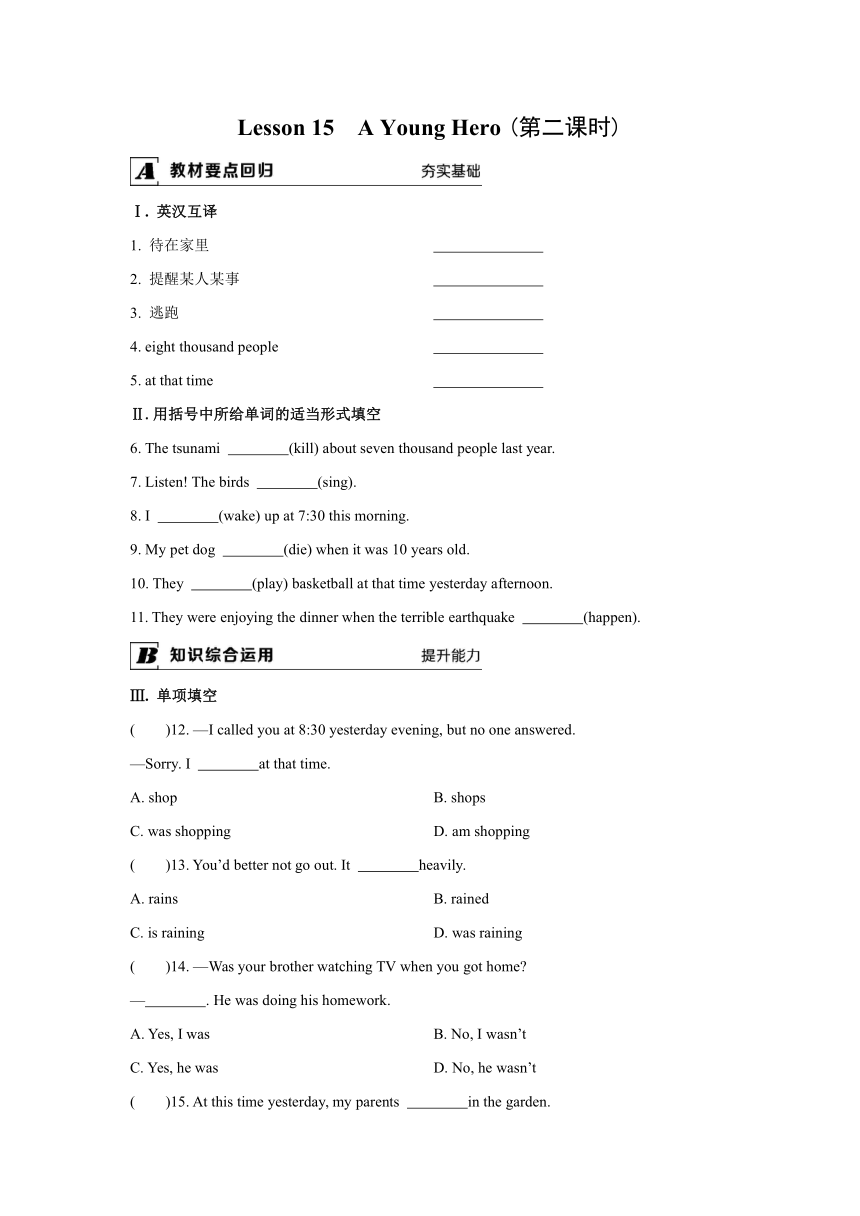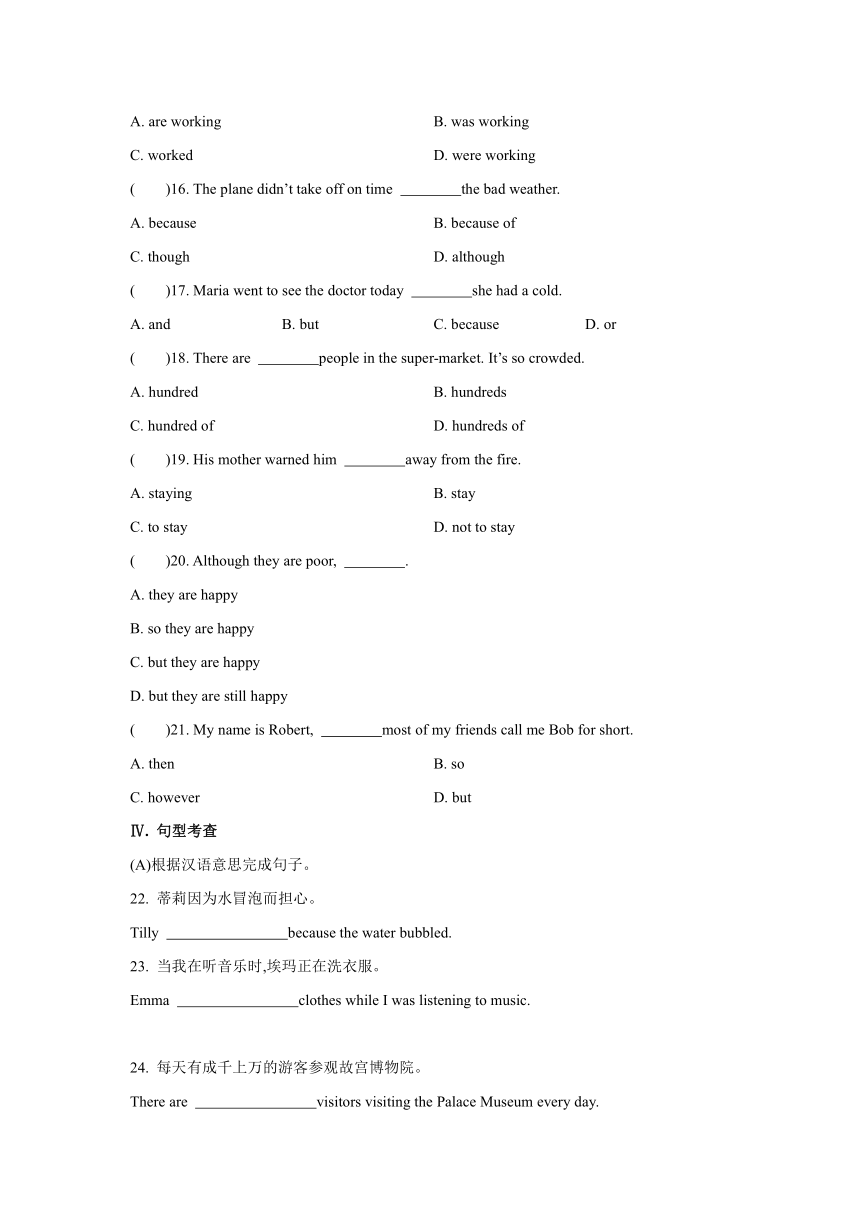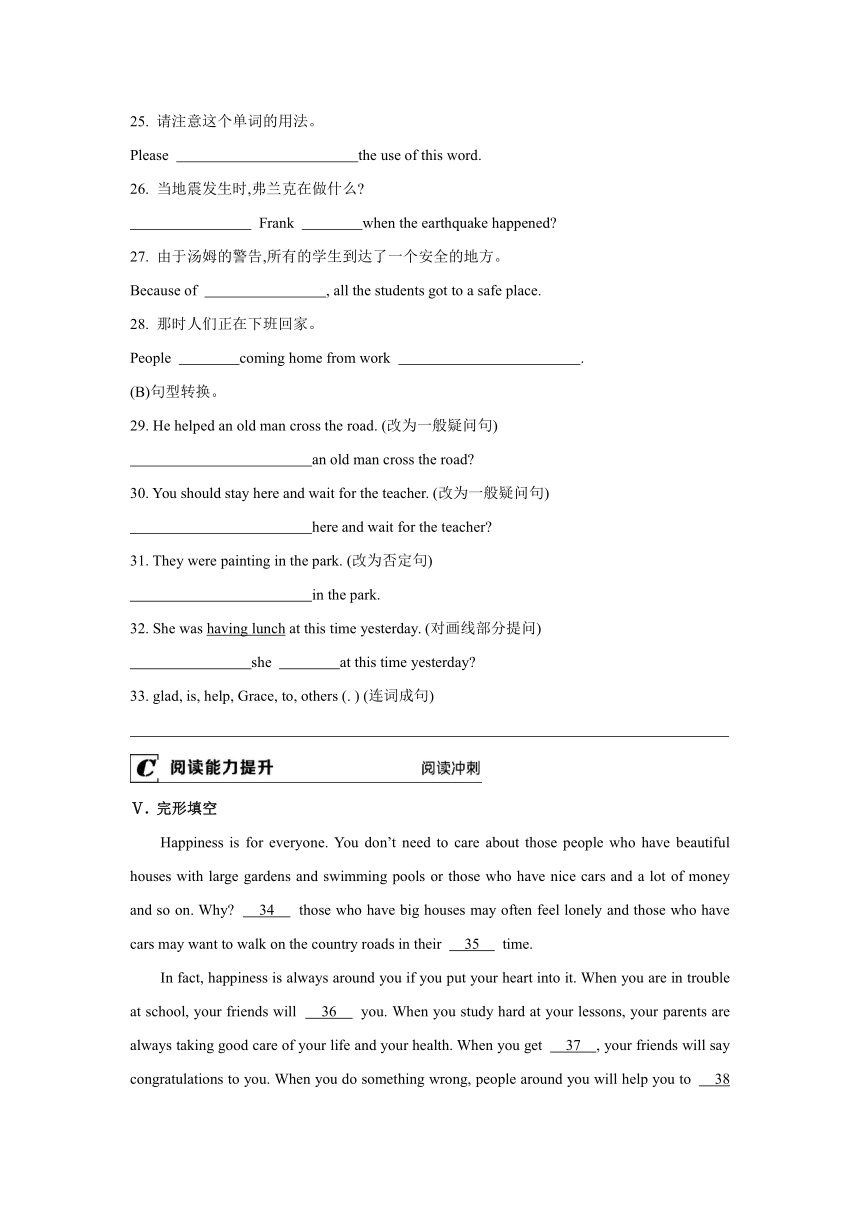北师大版英语八年级上册同步课时训练:Unit 5 Lesson 15 A Young Hero (第二课时)(含答案)
文档属性
| 名称 | 北师大版英语八年级上册同步课时训练:Unit 5 Lesson 15 A Young Hero (第二课时)(含答案) |  | |
| 格式 | docx | ||
| 文件大小 | 95.4KB | ||
| 资源类型 | 教案 | ||
| 版本资源 | 北师大版 | ||
| 科目 | 英语 | ||
| 更新时间 | 2022-04-07 21:51:55 | ||
图片预览



文档简介
Lesson 15 A Young Hero (第二课时)
Ⅰ. 英汉互译
1. 待在家里
2. 提醒某人某事
3. 逃跑
4. eight thousand people
5. at that time
Ⅱ.用括号中所给单词的适当形式填空
6. The tsunami (kill) about seven thousand people last year.
7. Listen! The birds (sing).
8. I (wake) up at 7:30 this morning.
9. My pet dog (die) when it was 10 years old.
10. They (play) basketball at that time yesterday afternoon.
11. They were enjoying the dinner when the terrible earthquake (happen).
Ⅲ. 单项填空
( )12. —I called you at 8:30 yesterday evening, but no one answered.
—Sorry. I at that time.
A. shop B. shops
C. was shopping D. am shopping
( )13. You’d better not go out. It heavily.
A. rains B. rained
C. is raining D. was raining
( )14. —Was your brother watching TV when you got home
— . He was doing his homework.
A. Yes, I was B. No, I wasn’t
C. Yes, he was D. No, he wasn’t
( )15. At this time yesterday, my parents in the garden.
A. are working B. was working
C. worked D. were working
( )16. The plane didn’t take off on time the bad weather.
A. because B. because of
C. though D. although
( )17. Maria went to see the doctor today she had a cold.
A. and B. but C. because D. or
( )18. There are people in the super-market. It’s so crowded.
A. hundred B. hundreds
C. hundred of D. hundreds of
( )19. His mother warned him away from the fire.
A. staying B. stay
C. to stay D. not to stay
( )20. Although they are poor, .
A. they are happy
B. so they are happy
C. but they are happy
D. but they are still happy
( )21. My name is Robert, most of my friends call me Bob for short.
A. then B. so
C. however D. but
Ⅳ. 句型考查
(A)根据汉语意思完成句子。
22. 蒂莉因为水冒泡而担心。
Tilly because the water bubbled.
23. 当我在听音乐时,埃玛正在洗衣服。
Emma clothes while I was listening to music.
24. 每天有成千上万的游客参观故宫博物院。
There are visitors visiting the Palace Museum every day.
25. 请注意这个单词的用法。
Please the use of this word.
26. 当地震发生时,弗兰克在做什么
Frank when the earthquake happened
27. 由于汤姆的警告,所有的学生到达了一个安全的地方。
Because of , all the students got to a safe place.
28. 那时人们正在下班回家。
People coming home from work .
(B)句型转换。
29. He helped an old man cross the road. (改为一般疑问句)
an old man cross the road
30. You should stay here and wait for the teacher. (改为一般疑问句)
here and wait for the teacher
31. They were painting in the park. (改为否定句)
in the park.
32. She was having lunch at this time yesterday. (对画线部分提问)
she at this time yesterday
33. glad, is, help, Grace, to, others (. ) (连词成句)
Ⅴ. 完形填空
Happiness is for everyone. You don’t need to care about those people who have beautiful houses with large gardens and swimming pools or those who have nice cars and a lot of money and so on. Why 34 those who have big houses may often feel lonely and those who have cars may want to walk on the country roads in their 35 time.
In fact, happiness is always around you if you put your heart into it. When you are in trouble at school, your friends will 36 you. When you study hard at your lessons, your parents are always taking good care of your life and your health. When you get 37 , your friends will say congratulations to you. When you do something wrong, people around you will help you to 38 it. When you do something good to others, you will feel happy, too. All these are your happiness. If you notice a bit of them, you can see that happiness is always around you.
Happiness is not the same as money. It is a feeling of your heart. When you are poor, you can also be very happy, because you have something else that can’t be bought with money. When you meet difficulties, you can say 39 you are very happy, because you have more 40 to challenge yourself. So you cannot always say you are poor or you have 41 luck. As the old saying goes, “Life is like a revolving door. When it closes, it also opens. ” If you take every chance you meet, you can be a happy and lucky person.
( )34. A. After B. Before C. If D. Because
( )35. A. free B. busy C. happy D. bad
( )36. A. give B. help C. take D. carry
( )37. A. things B. fruit C. success D. failure
( )38. A. do B. correct C. choose D. finish
( )39. A. strongly B. loudly C. quietly D. sadly
( )40. A. changes B. choices C. chances D. checks
( )41. A. good B. well C. worse D. bad
Ⅵ. 阅读短文,根据短文内容回答问题
Every 30 seconds there is an earthquake. But you don’t need to worry because most of them are so weak that they cannot be felt. Only a few big ones hurt people.
Many earthquakes happened in China, such as the big one in Sichuan in 2008. Thousands of people died in it. So it’s important to know what to do when one hits. Here are some tips on how to stay safe in an earthquake.
※If you stay indoors during an earthquake, hide(躲藏) under a desk. Stay away from windows and anything that could fall on you.
※If you stay outdoors, move to a clear place. Try to be away from trees, signs, buildings and street lights. These could fall on you.
※If you are in a shop and far from the door, don’t try to run outside or rush for exits(出口). Everyone will be doing that and you’ll find it hard to get out. Don’t get into a lift during an earthquake. Just hide under some strong covers near you.
※When an earthquake has ended, be careful because aftershocks may still happen. These are just as dangerous as the earthquake itself. So stay under the desk until you make sure it’s safe to get up.
※If you are at home and you smell gas(煤气), open the windows and get out of the building as quickly as you can. A gas line in your house may be broken. This could be very dangerous.
42. Every 30 seconds there is an earthquake. Why don’t you need to worry
43. Where should you hide if you stay indoors during an earthquake
44. Should we get into a lift during an earthquake
45. What should we do when an earthquake has ended
46. What can you learn from the passage
答案
Lesson 15 A Young Hero (第二课时)
Ⅰ. 1. stay at home 2. warn sb about sth
3. run away 4. 八千人 5. 在那时
Ⅱ. 6. killed 7. are singing 8. woke
9. died 10. were playing 11. happened
Ⅲ. 12. C 由答句的时间状语“at that time”可知,此处应该用过去进行时,故选C。
13. C 第一句句意:你最好不要出去。由此可推知外面正下着大雨。因此用现在进行时,故选C。
14. D 问句句意为“当你到家的时候,你的弟弟正在看电视吗 ”答句的第二句句意为“他正在做家庭作业”。所以应该是否定回答,且主语为he。
15. D 由时间状语“At this time yesterday”可知用过去进行时,且主语my parents是复数,故选D。
16. B 由句意“飞机没有准时起飞……坏天气”可知,前后是因果关系,且the bad weather是名词性短语,所以用because of。
17. C 18. D
19. C warn sb (not) to do sth意为“警告某人(不要)做某事”,根据语境可知选C。
20. A 考查although的用法。although/though 引导让步状语从句,主句前不能再用but,故选A。
21. D 考查并列连词。根据语境可知,此处表示转折,排除A和B。however和but都作“但是,然而”讲,但用法不同。 however后面用逗号隔开,而but后面不加逗号,故选D。
Ⅳ. 22. was worried
23. was washing
24. thousands of
25. pay attention to
26. What was, doing
27. Tom’s warning
28. were, at that time
29. Did he help
30. Should I/we stay
31. They weren’t painting
32. What was, doing
33. Grace is glad to help others.
Ⅴ. 【主旨大意】 这篇文章说明了什么是幸福,告诉我们尽管我们可能没有很多钱,但是在我们周围都能找到幸福。
34. D 考查连词。由前句“Why ”可知选because,意为“因为”。故选D。
35. A 考查形容词。in one’s free time意为“在某人的空闲时间”。故选A。
36. B 考查动词。句意:当你在学校有困难的时候,你的朋友们会帮助你。故选B。
37. C 38. B 39. B 40. C
41. D 考查形容词。句意:所以你不能总说你很可怜或者你很倒霉。bad luck意为“倒霉”。故选D。
Ⅵ. 42. Because most of them are so weak that they cannot be felt.
43. Under a desk.
44. No, we shouldn’t.
45. Be careful (because aftershocks may still happen) and stay under the desk until we make sure it’s safe to get up.
46. Some tips on how to stay safe in an earthquake.
Ⅰ. 英汉互译
1. 待在家里
2. 提醒某人某事
3. 逃跑
4. eight thousand people
5. at that time
Ⅱ.用括号中所给单词的适当形式填空
6. The tsunami (kill) about seven thousand people last year.
7. Listen! The birds (sing).
8. I (wake) up at 7:30 this morning.
9. My pet dog (die) when it was 10 years old.
10. They (play) basketball at that time yesterday afternoon.
11. They were enjoying the dinner when the terrible earthquake (happen).
Ⅲ. 单项填空
( )12. —I called you at 8:30 yesterday evening, but no one answered.
—Sorry. I at that time.
A. shop B. shops
C. was shopping D. am shopping
( )13. You’d better not go out. It heavily.
A. rains B. rained
C. is raining D. was raining
( )14. —Was your brother watching TV when you got home
— . He was doing his homework.
A. Yes, I was B. No, I wasn’t
C. Yes, he was D. No, he wasn’t
( )15. At this time yesterday, my parents in the garden.
A. are working B. was working
C. worked D. were working
( )16. The plane didn’t take off on time the bad weather.
A. because B. because of
C. though D. although
( )17. Maria went to see the doctor today she had a cold.
A. and B. but C. because D. or
( )18. There are people in the super-market. It’s so crowded.
A. hundred B. hundreds
C. hundred of D. hundreds of
( )19. His mother warned him away from the fire.
A. staying B. stay
C. to stay D. not to stay
( )20. Although they are poor, .
A. they are happy
B. so they are happy
C. but they are happy
D. but they are still happy
( )21. My name is Robert, most of my friends call me Bob for short.
A. then B. so
C. however D. but
Ⅳ. 句型考查
(A)根据汉语意思完成句子。
22. 蒂莉因为水冒泡而担心。
Tilly because the water bubbled.
23. 当我在听音乐时,埃玛正在洗衣服。
Emma clothes while I was listening to music.
24. 每天有成千上万的游客参观故宫博物院。
There are visitors visiting the Palace Museum every day.
25. 请注意这个单词的用法。
Please the use of this word.
26. 当地震发生时,弗兰克在做什么
Frank when the earthquake happened
27. 由于汤姆的警告,所有的学生到达了一个安全的地方。
Because of , all the students got to a safe place.
28. 那时人们正在下班回家。
People coming home from work .
(B)句型转换。
29. He helped an old man cross the road. (改为一般疑问句)
an old man cross the road
30. You should stay here and wait for the teacher. (改为一般疑问句)
here and wait for the teacher
31. They were painting in the park. (改为否定句)
in the park.
32. She was having lunch at this time yesterday. (对画线部分提问)
she at this time yesterday
33. glad, is, help, Grace, to, others (. ) (连词成句)
Ⅴ. 完形填空
Happiness is for everyone. You don’t need to care about those people who have beautiful houses with large gardens and swimming pools or those who have nice cars and a lot of money and so on. Why 34 those who have big houses may often feel lonely and those who have cars may want to walk on the country roads in their 35 time.
In fact, happiness is always around you if you put your heart into it. When you are in trouble at school, your friends will 36 you. When you study hard at your lessons, your parents are always taking good care of your life and your health. When you get 37 , your friends will say congratulations to you. When you do something wrong, people around you will help you to 38 it. When you do something good to others, you will feel happy, too. All these are your happiness. If you notice a bit of them, you can see that happiness is always around you.
Happiness is not the same as money. It is a feeling of your heart. When you are poor, you can also be very happy, because you have something else that can’t be bought with money. When you meet difficulties, you can say 39 you are very happy, because you have more 40 to challenge yourself. So you cannot always say you are poor or you have 41 luck. As the old saying goes, “Life is like a revolving door. When it closes, it also opens. ” If you take every chance you meet, you can be a happy and lucky person.
( )34. A. After B. Before C. If D. Because
( )35. A. free B. busy C. happy D. bad
( )36. A. give B. help C. take D. carry
( )37. A. things B. fruit C. success D. failure
( )38. A. do B. correct C. choose D. finish
( )39. A. strongly B. loudly C. quietly D. sadly
( )40. A. changes B. choices C. chances D. checks
( )41. A. good B. well C. worse D. bad
Ⅵ. 阅读短文,根据短文内容回答问题
Every 30 seconds there is an earthquake. But you don’t need to worry because most of them are so weak that they cannot be felt. Only a few big ones hurt people.
Many earthquakes happened in China, such as the big one in Sichuan in 2008. Thousands of people died in it. So it’s important to know what to do when one hits. Here are some tips on how to stay safe in an earthquake.
※If you stay indoors during an earthquake, hide(躲藏) under a desk. Stay away from windows and anything that could fall on you.
※If you stay outdoors, move to a clear place. Try to be away from trees, signs, buildings and street lights. These could fall on you.
※If you are in a shop and far from the door, don’t try to run outside or rush for exits(出口). Everyone will be doing that and you’ll find it hard to get out. Don’t get into a lift during an earthquake. Just hide under some strong covers near you.
※When an earthquake has ended, be careful because aftershocks may still happen. These are just as dangerous as the earthquake itself. So stay under the desk until you make sure it’s safe to get up.
※If you are at home and you smell gas(煤气), open the windows and get out of the building as quickly as you can. A gas line in your house may be broken. This could be very dangerous.
42. Every 30 seconds there is an earthquake. Why don’t you need to worry
43. Where should you hide if you stay indoors during an earthquake
44. Should we get into a lift during an earthquake
45. What should we do when an earthquake has ended
46. What can you learn from the passage
答案
Lesson 15 A Young Hero (第二课时)
Ⅰ. 1. stay at home 2. warn sb about sth
3. run away 4. 八千人 5. 在那时
Ⅱ. 6. killed 7. are singing 8. woke
9. died 10. were playing 11. happened
Ⅲ. 12. C 由答句的时间状语“at that time”可知,此处应该用过去进行时,故选C。
13. C 第一句句意:你最好不要出去。由此可推知外面正下着大雨。因此用现在进行时,故选C。
14. D 问句句意为“当你到家的时候,你的弟弟正在看电视吗 ”答句的第二句句意为“他正在做家庭作业”。所以应该是否定回答,且主语为he。
15. D 由时间状语“At this time yesterday”可知用过去进行时,且主语my parents是复数,故选D。
16. B 由句意“飞机没有准时起飞……坏天气”可知,前后是因果关系,且the bad weather是名词性短语,所以用because of。
17. C 18. D
19. C warn sb (not) to do sth意为“警告某人(不要)做某事”,根据语境可知选C。
20. A 考查although的用法。although/though 引导让步状语从句,主句前不能再用but,故选A。
21. D 考查并列连词。根据语境可知,此处表示转折,排除A和B。however和but都作“但是,然而”讲,但用法不同。 however后面用逗号隔开,而but后面不加逗号,故选D。
Ⅳ. 22. was worried
23. was washing
24. thousands of
25. pay attention to
26. What was, doing
27. Tom’s warning
28. were, at that time
29. Did he help
30. Should I/we stay
31. They weren’t painting
32. What was, doing
33. Grace is glad to help others.
Ⅴ. 【主旨大意】 这篇文章说明了什么是幸福,告诉我们尽管我们可能没有很多钱,但是在我们周围都能找到幸福。
34. D 考查连词。由前句“Why ”可知选because,意为“因为”。故选D。
35. A 考查形容词。in one’s free time意为“在某人的空闲时间”。故选A。
36. B 考查动词。句意:当你在学校有困难的时候,你的朋友们会帮助你。故选B。
37. C 38. B 39. B 40. C
41. D 考查形容词。句意:所以你不能总说你很可怜或者你很倒霉。bad luck意为“倒霉”。故选D。
Ⅵ. 42. Because most of them are so weak that they cannot be felt.
43. Under a desk.
44. No, we shouldn’t.
45. Be careful (because aftershocks may still happen) and stay under the desk until we make sure it’s safe to get up.
46. Some tips on how to stay safe in an earthquake.
同课章节目录
- Unit 1 Television
- Lesson 1 Last Week on TV
- Lesson 2 An Interview on TV
- Lesson 3 The Big Game
- Communication Workshop
- Unit 2 Teams
- Lesson 4 Class Projects
- Lesson 5 Teamwork
- Lesson 6 A Special Team
- Communication Workshop
- Unit 3 Faster,Higher,Stronge
- Lesson 7 Time to Exercise
- Lesson 8 Olympic Winners
- Lesson 9 Never Give Up!
- Communication Workshop
- Unit 4 Healthy Living
- Lesson 10 Going to the Doctor
- Lesson 11 Health Advice
- Lesson 12 Healthy Bones
- Communication Workshop
- Unit 5 Helping
- Lesson 13 Helping Your Community
- Lesson 14 Helping Each Other
- Lesson 15 A Young Hero
- Communication Workshop
- Unit 6 The Unexplained
- Lesson 16 Natural Abilities
- Lesson 17 True Stories?
- Lesson 18 Dreams
- Communication Workshop
